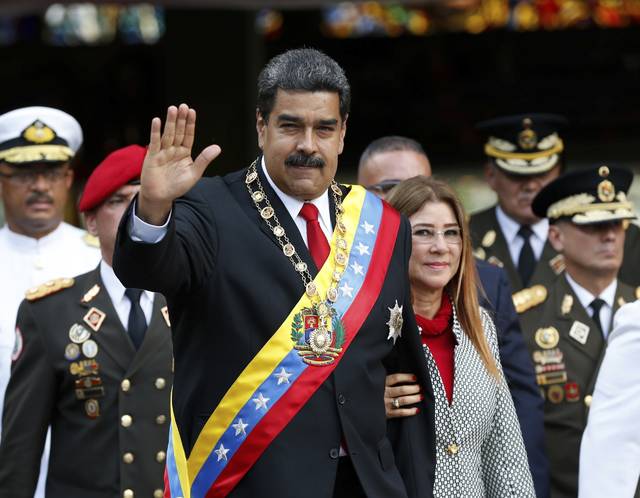CARACAS, Venezuela — President Nicolas Maduro said he is investing part of his personal savings in a gold-backed certificate as part of a much-questioned plan to crush hyperinflation and reactivate Venezuela’s moribund economy.
Maduro and First Lady Cilia Flores were the first in line at the central bank in downtown Caracas on Monday as it began selling the certificates.
He said he spent 350 bolivars — or about $6 at the recently devalued official exchange rate — acquiring the certificate, which functions like a fixed-term deposit that matures in a year and is supposedly backed by a 1.5 gram piece of gold held with the monetary authority.
“If I had a little more savings in bolivars I would have invested more,” Maduro said as cameras were rolling during his televised visit to the central bank. “Cilia had a little more than me, so she bought her certificate for a little ingot of 2.5 grams.”
In a country where five-digit inflation has all but destroyed savings it remains unclear how many Venezuelans will take up the government’s offer.
A few hours after Maduro left, the central bank’s main atrium — the only place where the certificates are being sold for now — was desolate, with only a handful of prospective buyers inquiring about the documentation required to make a purchase.
However, just around the block tensions were running high outside a state-owned bank as elderly pensioners waited in hours-long lines to withdraw the first part of a huge payment increase promised as part of Maduro’s monetary overhaul last month.
“This is a joke. How am I going to buy gold when my pension isn’t even enough to live on?” said Juan Vera, 71, sweating in the midday heat after waiting four hours for the bank to open.
Many in line, some of whom had arrived before dawn, said they were hoping to withdraw the pension in cash so they could resell the bills for a huge markup to wealthier Venezuelans looking to get their hands on cash that has gone scarce as the economy’s troubles have mounted. But many doubted the bank had enough bills on hand to satisfy the demand.
The gold savings plan is part of an economic overhaul slowly taking effect seeking to dismantle decade-old currency and price controls, boost government revenues and jumpstart private investment in the fast-decaying oil industry — the source of nearly all of Venezuela’s foreign currency earnings.
It’s the socialist revolution’s most far-reaching attempt to embrace the free market since Maduro took over as president from the late Hugo Chavez in 2013.
But many economists predict it’ll collapse almost immediately, as the government continues to print bolivars with abandon to fund a deficit estimated at over 20 percent of gross domestic product. Moreover, they say the deficit will widen, and inflation accelerate even further, as a result of the government’s decision to raise wages and pensions by over 3,000 percent to the equivalent of around $30 per month.
Maduro’s processor Chavez was also a gold bug, once famously repatriating from vaults in Europe the nation’s bullion reserves. But as the economy has spun further out of control Maduro’s cash-strapped government has had to offer up the declining gold reserves in exchange for loans to pay its mounting debts.





